人教版小学英语四大时态
- 格式:doc
- 大小:69.81 KB
- 文档页数:2
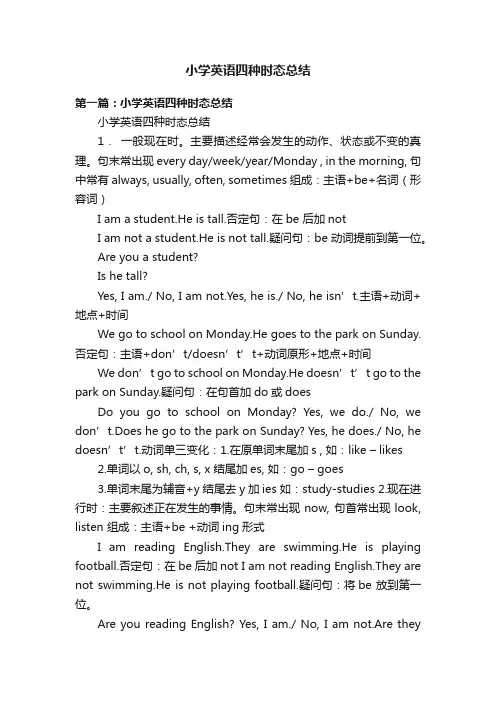
小学英语四种时态总结第一篇:小学英语四种时态总结小学英语四种时态总结1.一般现在时。
主要描述经常会发生的动作、状态或不变的真理。
句末常出现every day/week/year/Monday , in the morning, 句中常有always, usually, often, sometimes 组成:主语+be+名词(形容词)I am a student.He is tall.否定句:在be 后加notI am not a student.He is not tall.疑问句:be 动词提前到第一位。
Are you a student?Is he tall?Yes, I am./ No, I am not.Yes, he is./ No, he isn’t.主语+动词+地点+时间We go to school on Monday.He goes to the park on Sunday.否定句:主语+don’t/doesn’t’t+动词原形+地点+时间We don’t go to school on Monday.He doesn’t’t go to the park on Sunday.疑问句:在句首加do或doesDo you go to school on Monday? Yes, we do./ No, we don’t.Does he go to the park on Sunday? Yes, he does./ No, he doesn’t’t.动词单三变化:1.在原单词末尾加s , 如:like – likes2.单词以o, sh, ch, s, x 结尾加es, 如:go – goes3.单词末尾为辅音+y结尾去y加ies 如:study-studies 2.现在进行时:主要叙述正在发生的事情。
句末常出现now, 句首常出现look, listen 组成:主语+be +动词ing形式I am reading English.They are swimming.He is playing football.否定句:在be后加not I am not reading English.They are not swimming.He is not playing football.疑问句:将be 放到第一位。
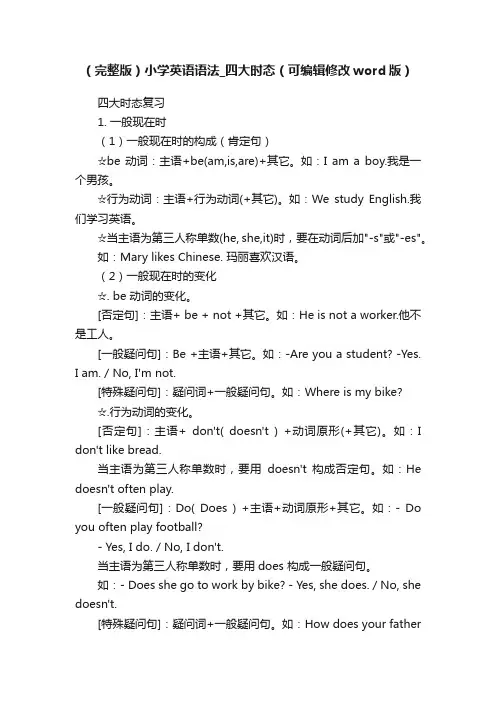
(完整版)小学英语语法_四大时态(可编辑修改word版)四大时态复习1. 一般现在时(1)一般现在时的构成(肯定句)☆be 动词:主语+be(am,is,are)+其它。
如:I am a boy.我是一个男孩。
☆行为动词:主语+行为动词(+其它)。
如:We study English.我们学习英语。
☆当主语为第三人称单数(he, she,it)时,要在动词后加"-s"或"-es"。
如:Mary likes Chinese. 玛丽喜欢汉语。
(2)一般现在时的变化☆. be 动词的变化。
[否定句]:主语+ be + not +其它。
如:He is not a worker.他不是工人。
[一般疑问句]:Be +主语+其它。
如:-Are you a student? -Yes.I am. / No, I'm not.[特殊疑问句]:疑问词+一般疑问句。
如:Where is my bike?☆.行为动词的变化。
[否定句]:主语+ don't( doesn't ) +动词原形(+其它)。
如:I don't like bread.当主语为第三人称单数时,要用doesn't 构成否定句。
如:He doesn't often play.[一般疑问句]:Do( Does ) +主语+动词原形+其它。
如:- Do you often play football?- Yes, I do. / No, I don't.当主语为第三人称单数时,要用does 构成一般疑问句。
如:- Does she go to work by bike? - Yes, she does. / No, she doesn't.[特殊疑问句]:疑问词+一般疑问句。
如:How does your fathergo to work?*动词+s 的变化规则1.一般情况下,直接加-s,如:cook-cooks, milk-milks2.以s. x. sh. ch. o 结尾,加-es,如:guess-guesses, wash-washes, watch-watches, go-goes3.以“辅音字母+y”结尾,变y 为i, 再加-es,如:study-studies2. 现在进行时(1)一般现在时的构成:be(am,is, are)+ 动词的ing 形式。
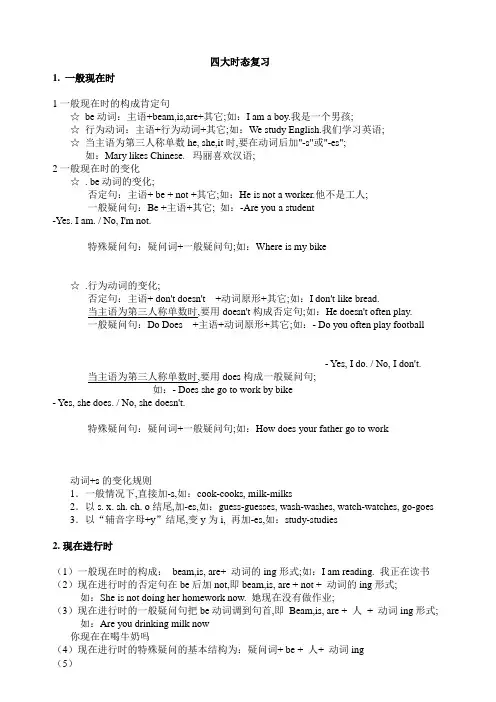
四大时态复习1. 一般现在时1一般现在时的构成肯定句☆be动词:主语+beam,is,are+其它;如:I am a boy.我是一个男孩;☆行为动词:主语+行为动词+其它;如:We study English.我们学习英语;☆当主语为第三人称单数he, she,it时,要在动词后加"-s"或"-es";如:Mary likes Chinese. 玛丽喜欢汉语;2一般现在时的变化☆. be动词的变化;否定句:主语+ be + not +其它;如:He is not a worker.他不是工人;一般疑问句:Be +主语+其它; 如:-Are you a student-Yes. I am. / No, I'm not.特殊疑问句:疑问词+一般疑问句;如:Where is my bike☆.行为动词的变化;否定句:主语+ don't doesn't +动词原形+其它;如:I don't like bread.当主语为第三人称单数时,要用doesn't构成否定句;如:He doesn't often play.一般疑问句:Do Does +主语+动词原形+其它;如:- Do you often play football- Yes, I do. / No, I don't.当主语为第三人称单数时,要用does构成一般疑问句;如:- Does she go to work by bike- Yes, she does. / No, she doesn't.特殊疑问句:疑问词+一般疑问句;如:How does your father go to work动词+s的变化规则1.一般情况下,直接加-s,如:cook-cooks, milk-milks2.以s. x. sh. ch. o结尾,加-es,如:guess-guesses, wash-washes, watch-watches, go-goes 3.以“辅音字母+y”结尾,变y为i, 再加-es,如:study-studies2.现在进行时(1)一般现在时的构成:beam,is, are+ 动词的ing形式;如:I am reading. 我正在读书(2)现在进行时的否定句在be后加not,即beam,is, are + not + 动词的ing形式;如:She is not doing her homework now. 她现在没有做作业;(3)现在进行时的一般疑问句把be动词调到句首,即Beam,is, are + 人+ 动词ing形式;如:Are you drinking milk now你现在在喝牛奶吗(4)现在进行时的特殊疑问的基本结构为:疑问词+ be + 人+ 动词ing(5)(6)如:Where are you going你现在去哪但who当主语时其结构为:Who + be + 动词ing如:Who is talking to you谁在和你说话动词加ing的变化规则1.一般情况下,直接加ing,如:cook-cooking2.以不发音的e结尾,去e加ing,如:make-making, taste-tasting3.如果末尾是一个元音字母和一个辅音字母,双写末尾的辅音字母,再加ing,如:run-running, stop-stopping3.一般将来时1一般将来时基本结构:①be going to + do动词原形;②will+ do动词原形.2否定句:在be动词am, is, are后加not或情态动词will后加not成won’t;结构为:beam, is, are + not + 动词原形will not + 动词原形will not = won’t例如:①I’m going to have a picnic this afternoon.→I’m not going to have a picnic this afternoon.②I will go shopping this weekend.→I will not go shopping this weekend.= I won’t go shopping this weekend.3一般疑问句:be或will提到句首,some改为any, and改为or,第一二人称互换;例如:①We are going to go on an outing this weekend.→Are you going to go on an outing this weekend②I will play football tomorrow afternoon.→Will you play football tomorrow afternoon4特殊疑问句①问人用Who例如:I’m going to New York soon. →Who’s going to New York soon.②问干什么用What …do.例如:My father is going to watch a race with me this afternoon.→What is your father going to do with you this afternoon.③问什么时候用When.例如:She’s going to go to bed at nine. →When is she going to bed4.一般过去时1.肯定句be动词在一般过去时中的变化:☆am 和is在一般过去时中变为was;was not=wasn’t☆are在一般过去时中变为were;were not=weren’t行为动词在一般过去时的句子中要变成过去式一般是在句子后面加ed(2)否定句:be动词变成was notwasn’t 或were not weren’t如:He wasn’t a teacher two years ago.didn’t +动词原形如:Jim didn’t go home yesterday.(3)一般疑问句有be动词的一般疑问句把was或were调到句首;如:Were you a teacher two years ago句中没有be动词的一般过去时的句子,在句首加did,句子中的动词过去式变回原形;如:Did Jim go home yesterday4特殊疑问句:①疑问词+did+主语+动词原形如:What did Jim do yesterday②疑问词是who时:疑问词+动词过去式如:Who went to home yesterday动词过去式变化规则:☆.一般在动词末尾加-ed,如:pull-pulled, cook-cooked☆.结尾是e加d,如:taste-tasted☆.末尾只有一个元音字母和一个辅音字母的重读闭音节,应双写末尾的辅音字母, 再加-ed,如:stop-stopped☆.以“辅音字母+y”结尾的,变y为i, 再加-ed,如:study-studied☆.不规则动词过去式:am,is-was, are-were, do-did, see-saw, say-said, give-gave, get-got, go-went, come-came, have-had, eat-ate, take-took,run-ran, sing-sang, put-put, make-made, read-read, write-wrote, draw-drew, drink-drank, fly-flew, ride-rode,speak-spoke, sweep-swept, swim-swam, sit-sat随堂练习一、写出下列动词的第三人称单数drink ________ go _______ stay ________ make ________ look _________ have_______ pass_______ carry ____ come________ watch______ plant_______ fly ________study_______ brush________ do_________ teach_______二、按照要求改写句子1. Daniel watches TV every evening.改为否定句___________________________________________________2. I do my homework every day.改为一般疑问句,作否定回答________________________________________________________3. She likes milk.改为一般疑问句,作肯定回答___________________________4. I like taking photos in the park.对划线部分提问________________________________________________________5. John comes from Canada.对划线部分提问___________________________________________________三.写出下列动词的现在分词:play________ run__________ swim _________make__________ go_________ like________ write________ _ski___________ read________ have_________ sing ________ dance_________ put_________ see________ buy _________ love____________ live_______ take_________ come ________ get_________ stop_________ sit ________ begin________ shop___________四、句型转换:1. They are doing housework .改成否定句_____________________________________________________________2.The students are cleaning the classroom . 改一般疑问句并作肯定和否定回答__________________________________________________________________________________________________________________________________3.I’m playing the football in the playground .对划线部分进行提问_________________________________________________________________4.Tom is reading books in his study . 对划线部分进行提问_________________________________________________________________五.填空;1. 我打算明天和朋友去野炊;I_____ _______ _________ have a picnic with my friends.I ________ have a picnic with my friends.2. 下个星期一你打算去干嘛我想去打篮球;What ________ ________ _________ _________ _________ next Monday I _______ ______ _____ play basketball.What _________ you do next Monday I ________ play basketball.3. 你妈妈这个周末去购物吗是,她要去买一些水果;_____ your mother _______ ________ go shopping this ___________ Yes, she _________.She ______ ________ __________ buy some fruit.4. 你们打算什么时候见面;What time _______ you _________ __________ meet5. Nancy is going to go camping.改否定Nancy ________ going to go camping.6. I’ll go and join them.改否定I _______ go ______ join them.7. I’m going to get up at 6:30 tomorrow.改一般疑问句________ _______ ________ to get up at 6:30 tomorrow8. We will meet at the bus stop at 10:30.改一般疑问句_______ ________ meet at the bus stop at 10:30.9. She is going to listen to music after school.对划线部分提问________ _______ she ________ ________ _________ after school10. My father and mother are going to see a play the day after tomorrow.对划线部分提问_________ _________ going to see a play the day after tomorrow.七.写出下列动词的过去式fly_______ plant________ are ________ drink_________ play_______ go________make ________ does_________ dance________ worry________ ask _____ taste_________ eat__________ draw________ put ______ throw________ kick_________ pass_______do ________八、句型转换1. It was exciting.否定句:________________________________________________ 一般疑问句:____________________________________________ 肯、否定回答:__________________________________________ 2. All the students were very excited.否定句:________________________________________________ 一般疑问句:____________________________________________ 肯、否定回答:__________________________________________ 3. They were in his pocket.否定句:________________________________________________ 一般疑问句:____________________________________________ 肯、否定回答:__________________________________________ 4. Su Hai took some photos at the Sports day.否定句:________________________________________________ 一般疑问句:____________________________________________ 肯、否定回答:__________________________________________ 5. Nancy went to school early.否定句:________________________________________________ 一般疑问句:____________________________________________ 肯、否定回答:__________________________________________ 6. We sang some English songs.否定句:________________________________________________ 一般疑问句:____________________________________________ 肯、否定回答:__________________________________________。
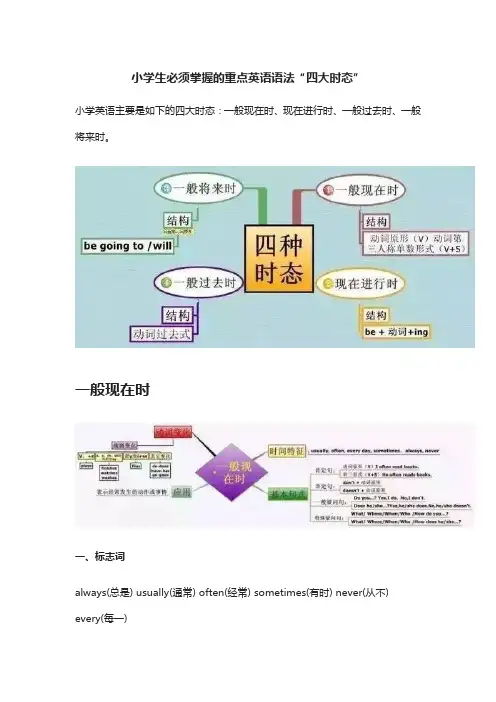
小学生必须掌握的重点英语语法“四大时态”小学英语主要是如下的四大时态:一般现在时、现在进行时、一般过去时、一般将来时。
一般现在时一、标志词always(总是) usually(通常) often(经常) sometimes(有时) never(从不) every(每一)二、基本用法1.表示事物或人物的特征、状态。
2.表示经常性、习惯性的动作。
3.表示客观现实。
三、构成1.be动词:主语+be动词(am isare)+其它.2.行为动词:主语+行为动词+其它。
四、句型肯定句:A. be 动词:be+主语+其它。
B. 行为动词:主语+动词(注意人称变化)+其它。
否定句:A.be动词:主语+be+not+其它。
B.行为动词:主语+助动词(do/does)+not+d动词原形+其它一般疑问句:A.be动词:be+主语+其它。
B.行为动词:助动词(Do/Does)+主语+动词原形+其他.特殊疑问词:疑问词+一般疑问句现在进行时一、标志词now(现在), look(看),listen(听)二、基本用法表示现阶段正在进行的动作三、基本结构1.肯定句:主语+be动词+动词现在分词(ing)+其它。
2.否定句:主语+be动词+not+动词现在分词(ing)+其它。
3.一般疑问句:be动词+主语+现在分词(ing)+其它。
4.特殊疑问句:疑问词+一般疑问句。
一般将来时一、标志词tomorrow(明天),soon(不久),will(将要=be going to)二、基本用法表示在在将来某个时间要发生的动作或存在的状态。
三、基本结构1.肯定句:主语+ be going to + 动词原形。
主语+will+动词原形。
2.否定句:主语+ be going to +动词原形。
主语+won’t + 动词原形3.一般疑问句:Be + 主语+ going to+动词原形Will + 主语+ 动词原形4.特殊疑问句:疑问词+一般疑问句一般过去时一、标志词yesterday(昨天),ago(以前),before(在...之前)二、用法1.表示过去某个时间发生的动作或存在的状态,常和表示过去的时间状语连用。
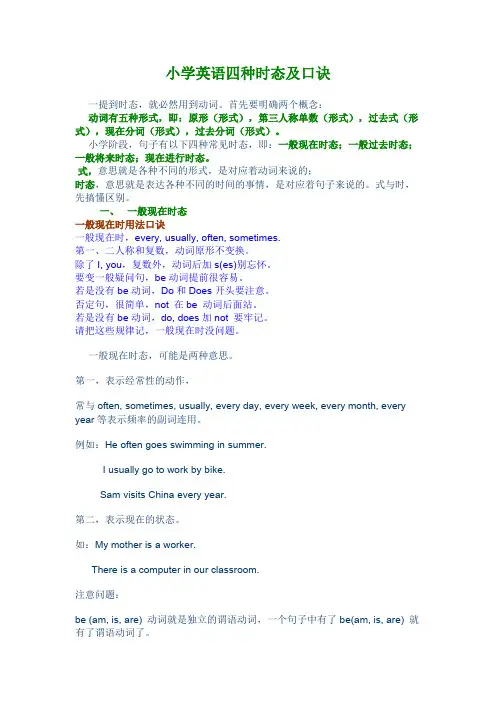
小学英语四种时态及口诀一提到时态,就必然用到动词。
首先要明确两个概念:动词有五种形式,即:原形(形式),第三人称单数(形式),过去式(形式),现在分词(形式),过去分词(形式)。
小学阶段,句子有以下四种常见时态,即:一般现在时态;一般过去时态;一般将来时态;现在进行时态。
式,意思就是各种不同的形式,是对应着动词来说的;时态,意思就是表达各种不同的时间的事情,是对应着句子来说的。
式与时,先搞懂区别。
一、一般现在时态一般现在时用法口诀一般现在时,every, usually, often, sometimes.第一、二人称和复数,动词原形不变换。
除了I, you,复数外,动词后加s(es)别忘怀。
要变一般疑问句,be动词提前很容易。
若是没有be动词,Do和Does开头要注意。
否定句,很简单,not 在be 动词后面站。
若是没有be动词,do, does加not 要牢记。
请把这些规律记,一般现在时没问题。
一般现在时态,可能是两种意思。
第一,表示经常性的动作,常与often, sometimes, usually, every day, every week, every month, every year等表示频率的副词连用。
例如:He often goes swimming in summer.I usually go to work by bike.Sam visits China every year.第二,表示现在的状态。
如:My mother is a worker.There is a computer in our classroom.注意问题:be (am, is, are) 动词就是独立的谓语动词,一个句子中有了be(am, is, are) 就有了谓语动词了。
句子中不能同时出现两个谓语动词。
不少同学经常出这样的错误:The boy is often eats hamburgers.(错)应改为:The boy often eats hamburgers.二、现在进行时态正在进行时态口诀现在分词用途多,进行时态不用说。
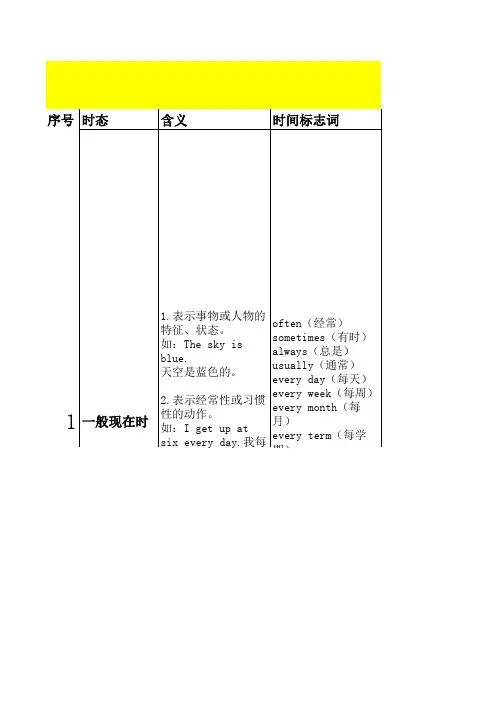
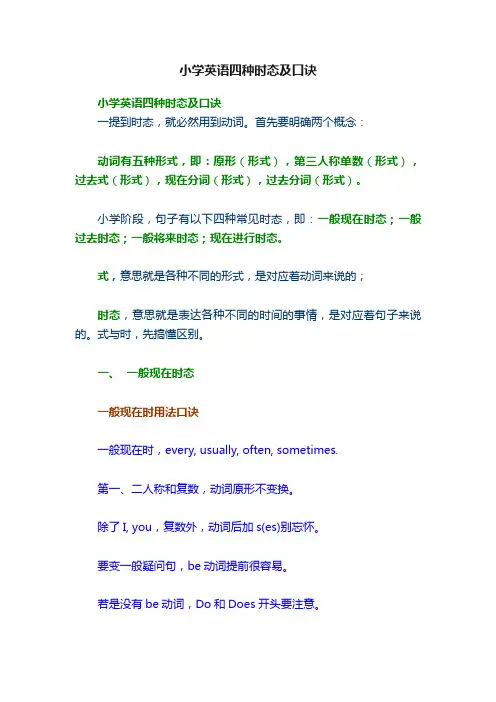
小学英语四种时态及口诀小学英语四种时态及口诀一提到时态,就必然用到动词。
首先要明确两个概念:动词有五种形式,即:原形(形式),第三人称单数(形式),过去式(形式),现在分词(形式),过去分词(形式)。
小学阶段,句子有以下四种常见时态,即:一般现在时态;一般过去时态;一般将来时态;现在进行时态。
式,意思就是各种不同的形式,是对应着动词来说的;时态,意思就是表达各种不同的时间的事情,是对应着句子来说的。
式与时,先搞懂区别。
一、一般现在时态一般现在时用法口诀一般现在时,every, usually, often, sometimes.第一、二人称和复数,动词原形不变换。
除了I, you,复数外,动词后加s(es)别忘怀。
要变一般疑问句,be动词提前很容易。
若是没有be动词,Do和Does开头要注意。
否定句,很简单,not 在be 动词后面站。
若是没有be动词,do, does加not 要牢记。
请把这些规律记,一般现在时没问题。
一般现在时态,可能是两种意思。
第一,表示经常性的动作,常与often, sometimes, usually, every day, everyweek, every month, every year等表示频率的副词连用。
例如:He often goes swimming in summer.I usually go to work by bike.Sam visits China every year.第二,表示现在的状态。
如:My mother is a worker.There is a computer in our classroom.注意问题:be (am, is, are) 动词就是独立的谓语动词,一个句子中有了be(am, is, are) 就有了谓语动词了。
句子中不能同时出现两个谓语动词。
不少同学经常出这样的错误:The boy is often eats hamburgers.(错)应改为: The boy often eats hamburgers.二、现在进行时态正在进行时态口诀现在分词用途多,进行时态不用说。
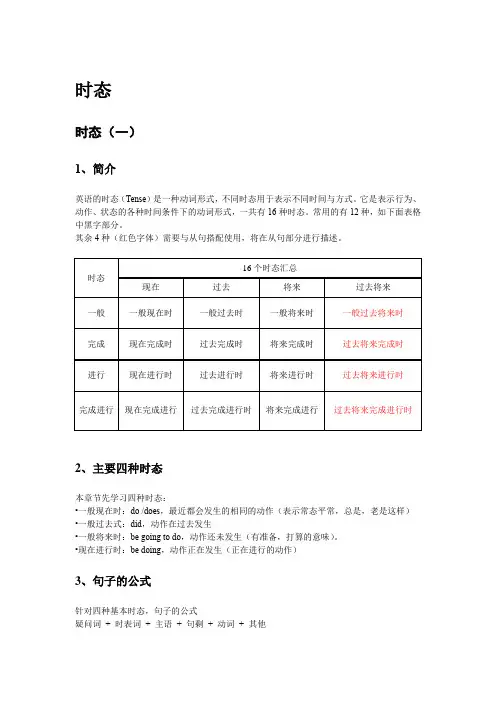
时态时态(一)1、简介英语的时态(Tense)是一种动词形式,不同时态用于表示不同时间与方式。
它是表示行为、动作、状态的各种时间条件下的动词形式,一共有16种时态。
常用的有12种,如下面表格中黑字部分。
其余4种(红色字体)需要与从句搭配使用,将在从句部分进行描述。
2、主要四种时态本章节先学习四种时态:•一般现在时:do /does,最近都会发生的相同的动作(表示常态平常,总是,老是这样)•一般过去式:did,动作在过去发生•一般将来时:be going to do,动作还未发生(有准备,打算的意味)。
•现在进行时:be doing,动作正在发生(正在进行的动作)3、句子的公式针对四种基本时态,句子的公式疑问词+ 时表词+ 主语+ 句剩+ 动词+ 其他【注】主语是动作的发起者,宾语是动作的承受者,句剩只有在一般将来时才用!【例句】1、你刚才去哪儿了?Where did you go?2、你平常都什么时候回来?When do you come back?3、你在吃什么?What are you eating?4、你怎么跟他说的?How did you tell him4、人称相关它it it its its itself他们They them their theirs themselves 【注】此表格格外重要,不要忽视!!!时态(二)1、简介•时态和句子结构清楚后,开始造句,按句子类型分为陈述句和疑问句。
•陈述句又分为肯定句和否定句;疑问句分为特殊疑问句和一般疑问句。
2、一般疑问句与特殊疑问句一般疑问句疑问词时表词主语句剩动词其他Do you know himDid You see herAre you going to eatIs he working特殊疑问句How do you know him Where did You see herWhen are you going to eatHow is he working【注】1、不可以延续的动词(例如:come来,go去,leave离开,arrive到达,start/begin开始)可用现在进行时表将来Are you going to New York = Are you going to go to New York?2、Who和whom的区别:who用于主语或者宾语,whom只能用于宾语。
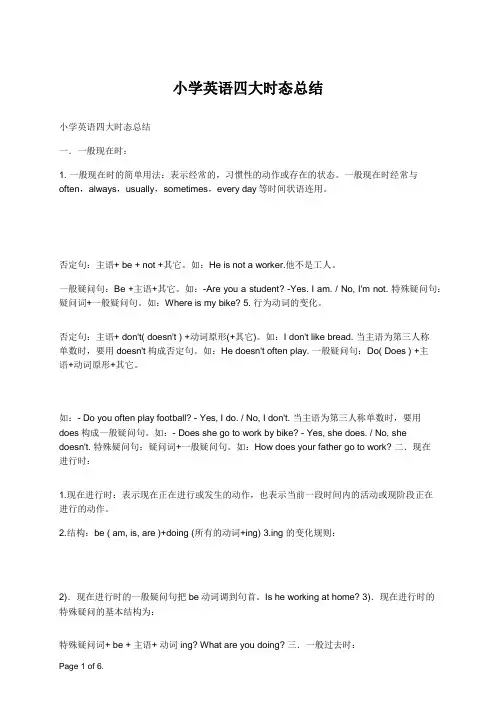
小学英语四大时态总结小学英语四大时态总结一.一般现在时:1. 一般现在时的简单用法:表示经常的,习惯性的动作或存在的状态。
一般现在时经常与often,always,usually,sometimes,every day等时间状语连用。
否定句:主语+ be + not +其它。
如:He is not a worker.他不是工人。
一般疑问句:Be +主语+其它。
如:-Are you a student? -Yes. I am. / No, I'm not. 特殊疑问句:疑问词+一般疑问句。
如:Where is my bike? 5. 行为动词的变化。
否定句:主语+ don't( doesn't ) +动词原形(+其它)。
如:I don't like bread. 当主语为第三人称单数时,要用doesn't构成否定句。
如:He doesn't often play. 一般疑问句:Do( Does ) +主语+动词原形+其它。
如:- Do you often play football? - Yes, I do. / No, I don't. 当主语为第三人称单数时,要用does构成一般疑问句。
如:- Does she go to work by bike? - Yes, she does. / No, shedoesn't. 特殊疑问句:疑问词+一般疑问句。
如:How does your father go to work? 二.现在进行时:1.现在进行时:表示现在正在进行或发生的动作,也表示当前一段时间内的活动或现阶段正在进行的动作。
2.结构:be ( am, is, are )+doing (所有的动词+ing)3.ing 的变化规则:2).现在进行时的一般疑问句把be动词调到句首。
Is he working at home? 3).现在进行时的特殊疑问的基本结构为:特殊疑问词+ be + 主语+ 动词ing? What are you doing? 三.一般过去时:I. 一般过去时的概念:表示过去某个时间发生的动作或存在的状态。
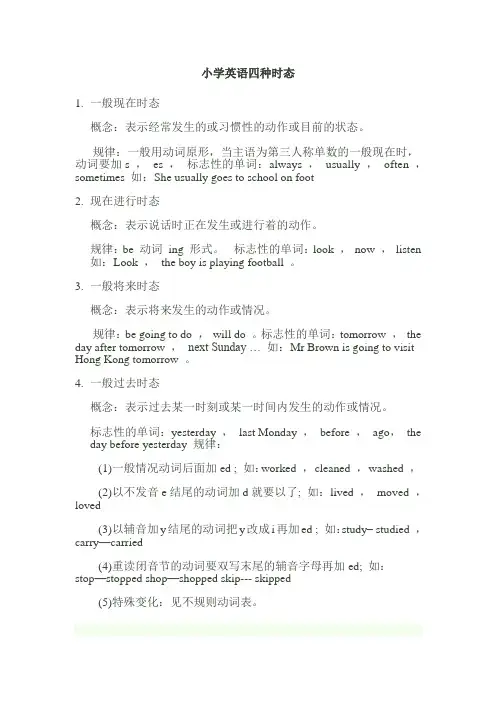
小学英语四种时态1.一般现在时态概念:表示经常发生的或习惯性的动作或目前的状态。
规律:一般用动词原形,当主语为第三人称单数的一般现在时,动词要加s ,es ,标志性的单词:always ,usually ,often ,sometimes 如:She usually goes to school on foot2.现在进行时态概念:表示说话时正在发生或进行着的动作。
规律:be 动词ing 形式。
标志性的单词:look ,now ,listen 如:Look ,the boy is playing football 。
3.一般将来时态概念:表示将来发生的动作或情况。
规律:be going to do ,will do 。
标志性的单词:tomorrow ,the day after tomorrow ,next Sunday … 如:Mr Brown is going to visit Hong Kong tomorrow 。
4.一般过去时态概念:表示过去某一时刻或某一时间内发生的动作或情况。
标志性的单词:yesterday ,last Monday ,before ,ago,the day before yesterday 规律:(1)一般情况动词后面加ed ; 如:worked ,cleaned ,washed ,(2)以不发音e结尾的动词加d就要以了; 如:lived ,moved ,loved(3)以辅音加y结尾的动词把y改成i再加ed ; 如:study– studied ,carry—carried(4)重读闭音节的动词要双写末尾的辅音字母再加ed; 如:stop—stopped shop—shopped skip--- skipped(5)特殊变化:见不规则动词表。
小学英语固定搭配Good night 晚安.in the morning 在早上at noon 在中午in the afternoon 在下午in the evening 在傍晚at night 在夜间have/eat breakfast 吃早饭have/eat lunch 吃午饭have/eat supper(dinner) 吃晚饭read a book 读书sing a song 唱歌have a meeting 开会have class 上课have a party 聚会have a competition 竞赛have a sleep 睡觉have a snack 吃零食have a picnic 野餐have a buffet dinner 吃自助餐draw pictures 画画listen to music 听音乐listen to the radio 听收音机learn English 学习英语learn Chinese 学习语文Learn math 学习数学tell stories 讲故事take a walk 散步ask and answer questions 问答问题fly a kite 放风筝ride a bike 骑自行车ride a horse 骑马play computer games 玩电脑游戏play games 做游戏play hide and seek 玩捉迷藏do homework 做作业watch TV 看电视take a shower 洗淋浴take a bath 洗澡open the door 开门open the window 开窗户close the door 关门close the window 关窗户paly football 踢足球/打橄榄球play basketball 打篮球play volleyball 打排球play badminton 打羽毛球play golf 打高尔夫球play bowling 打保龄球play table tennis 打乒乓球play baseball 打棒球play tennis 打网球play soccer 踢足球play hockey 打曲棍球play chess 下棋go fishing 去钓鱼go swimming 去游泳go shopping 去购物go skating 去滑冰go bike-riding/ go cycling 去骑自行车go sking 去滑雪go camping 去野营listen to the news 听新闻read the newspaper 看报read the magazine 看杂志go to school 去上学go home 回家go to the park 去公园go to the zoo 去动物园go to the library 去图书馆go to the hospital 去医院go to the cinema 去电影院go to see a film /movie去看电影get up 起床go to bed 上床go to sleep 去睡觉brush the teeth 刷牙wash the hands 洗手wash the face 洗脸wash clothes 洗衣服air the room 给房间通风make the bed 铺床sweep the floor 扫地mop the floor 拖地clean the room 打扫房间climb the trees 爬树climb the mountains 爬山cook the meals 做饭drink milk/juice/coca cola 喝牛奶/果汁/可乐play the piano 弹钢琴play the violin 拉小提琴play the drum 打鼓play the guitar 弹吉他play the xylophone 弹木琴play the flute 吹笛子play the harp 弹竖琴play the erhu 拉二胡play the zither 弹古筝play the banjo 弹班卓play the trumpet 吹小号stay at home 呆在家里at home 在家at school 在学校at church 在教堂make a cake 做蛋糕take pictures/photos 照相comb hair 梳头发have a haircut 理发go away 走开at the weekend 在周末stand up 起立sit down 坐下New year 元旦Spring Festival 春节Lantern Festival 元宵节Spring Cleaning Day 清明节Dragon Boat Festival 龙舟节International labour day 国际劳动节Trees planting day 植树节Children's day 儿童节Party's day 党的生日Army's day 建军节Teacher's day 教师节National day 国庆节Thanksgiving day 感恩节Chrismas day 圣诞节in the morning 在早上at noon 在中午in the afternoon 在下午in the evening 在傍晚at night 在夜间have/eat breakfast 吃早饭have/eat lunch 吃午饭have/eat supper(dinner) 吃晚饭read a book 读书sing a song 唱歌have a meeting 开会have class 上课have a party 聚会have a competition 竞赛have a sleep 睡觉have a snack 吃零食have a picnic 野餐have a buffet dinner 吃自助餐draw pictures 画画listen to music 听音乐listen to the radio 听收音机learn English 学习英语learn Chinese 学习语文Learn math 学习数学tell stories 讲故事take a walk 散步ask and answer questions 问答问题fly a kite 放风筝ride a bike 骑自行车ride a horse 骑马play computer games 玩电脑游戏play games 做游戏play hide and seek 玩捉迷藏do homework 做作业watch TV 看电视take a shower 洗淋浴take a bath 洗澡open the door 开门open the window 开窗户close the door 关门close the window 关窗户paly football 踢足球/打橄榄球play basketball 打篮球play volleyball 打排球play badminton 打羽毛球play golf 打高尔夫球play bowling 打保龄球play table tennis 打乒乓球play baseball 打棒球play tennis 打网球play soccer 踢足球play hockey 打曲棍球play chess 下棋go fishing 去钓鱼go swimming 去游泳go shopping 去购物go skating 去滑冰go bike-riding/ go cycling 去骑自行车go sking 去滑雪go camping 去野营listen to the news 听新闻read the newspaper 看报read the magazine 看杂志go to school 去上学go home 回家go to the park 去公园go to the zoo 去动物园go to the library 去图书馆go to the hospital 去医院go to the cinema 去电影院go to see a film /movie去看电影get up 起床go to bed 上床go to sleep 去睡觉brush the teeth 刷牙wash the hands 洗手wash the face 洗脸wash clothes 洗衣服air the room 给房间通风make the bed 铺床sweep the floor 扫地mop the floor 拖地clean the room 打扫房间climb the trees 爬树climb the mountains 爬山cook the meals 做饭drink milk/juice/coca cola 喝牛奶/果汁/可乐play the piano 弹钢琴play the violin 拉小提琴play the drum 打鼓play the guitar 弹吉他play the xylophone 弹木琴play the flute 吹笛子play the harp 弹竖琴play the erhu 拉二胡play the zither 弹古筝play the banjo 弹班卓play the trumpet 吹小号stay at home 呆在家里at home 在家at school 在学校at church 在教堂make a cake 做蛋糕take pictures/photos 照相comb hair 梳头发have a haircut 理发go away 走开at the weekend 在周末stand up 起立sit down 坐下New year 元旦Spring Festival 春节Lantern Festival 元宵节Spring Cleaning Day 清明节Dragon Boat Festival 龙舟节International labour day 国际劳动节Trees planting day 植树节Children's day 儿童节Party's day 党的生日Army's day 建军节Teacher's day 教师节National day 国庆节小学英语动词过去式agree 同意agreedask 问askedanswer 回答answeredbecome 成为becamebegin 开始beganbring 带来broughtbuy 买boughtcall 呼叫calledcarry 搬运carriedcatch 抓住caughtcheck 检查checkedclean 清洁cleanedclimb 爬climbedcome 来camecook 煮cookedcut 切cutdance 跳舞danceddo 做diddraw 画drewdrink 喝drankdrive 驾驶droveeat 吃ateenjoy 欣赏enjoyedfeel 感觉feltfly 飞fliedforget 忘记forgotfish 钓鱼fishedget 得到gotgive 给gavego 去wentgrow 成长grewhave 有hadhear 听到heardhelp 帮助helpedjump 跳jumpedkeep 保存keptknow 知道knewlearn 学习learned listen 听listenedlike 喜欢likedlook 看lookedlive 生活livedlove 喜爱lovedmake 做mademeet 遇见metmove 移动moved need 需要needed open 打开opened paint 画paintedpick 摘pickedplay 玩playedplan 计划planned practise 练习practised prefer 更喜欢preferred put 放putread 读readride 骑roderun 跑ransay 说saidsee 看sawsit 坐satskip 跳skippedspeak 说spokestart 开始startedstay 停留stayed sweep 扫sweptstudy 学习studied swim 游泳swamtalk 谈话talkedtake 带去tookteach 教taughtthank 谢谢thanked tell 告诉toldthink 想thought travel 旅游traveledtry 试trieduse 使用used wake 醒来woke walk 走路walked want 想wanted wash 洗washed watch 看watched water 浇水watered wave 挥动waved work 工作worked worry 担心worried write 写wrote小学英语可数名词复数形式1)以y结尾的专有名词,或元音字母+y 结尾的名词变复数时,直接加s变复数。
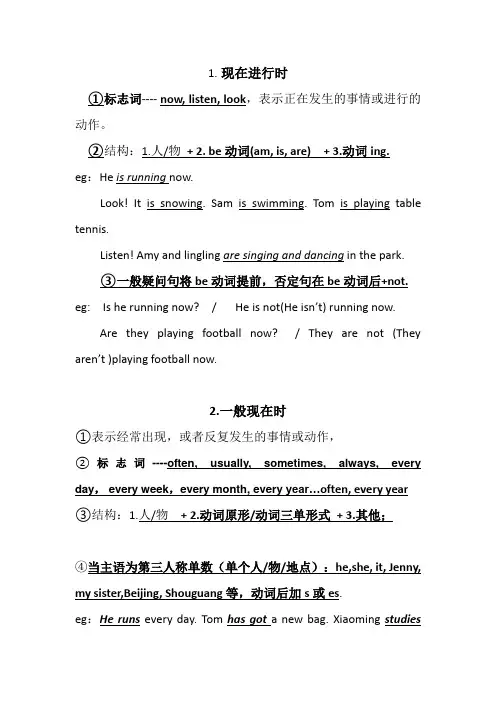
1.现在进行时①标志词---- now, listen, look,表示正在发生的事情或进行的动作。
②结构:1.人/物+ 2. be动词(am, is, are) + 3.动词ing. eg:He is running now.Look! It is snowing. Sam is swimming. Tom is playing table tennis.Listen! Amy and lingling are singing and dancing in the park.③一般疑问句将be动词提前,否定句在be动词后+not. eg: Is he running now? / He is not(He isn’t) running now.Are they playing football now? / They are not (They aren’t )playing football now.2.一般现在时①表示经常出现,或者反复发生的事情或动作,②标志词----often, usually, sometimes, always, every③结构:1.人/物+ 2.动词原形/动词三单形式+ 3.其他;④当主语为第三人称单数(单个人/物/地点):he,she, it, Jenny, my sister,Beijing, Shouguang等,动词后加s或es.eg:He runs every day. Tom has got a new bag. Xiaoming studiesvery hard every day. Mr Smart speaks Chinese very well. They often read books .问句借助于do, does。
否定句借助于don’t, doesn’t,后面动词一定要还原。
Does he run every day? / He doesn’t run every day.Do they often read books? / They don’t often read books.3.一般过去时①表示发生在过去的事情或者事件,标志词----in the past,then, two hours (ago), yesterday, last week,last month; last year。
小学英语通常涵盖四种基本时态:一般现在时、现在进行时、一般过去时和一般将来时。
以下是这四种时态的详细总结,旨在帮助小学生更好地理解和运用这些时态。
一、一般现在时一般现在时用于描述经常发生的动作或状态,以及不受时间限制的事实或真理。
基本用法:1.主语为第三人称单数(he/she/it/单数名词):动词需加-s或-es。
例如:She watches TV every day.2.主语为其他形式(I/you/we/they/复数名词):动词用原形。
例如:We play football on Sundays.时间状语:•always, usually, often, sometimes, never•every day, once a week, twice a month注意事项:•当主语是第三人称单数时,动词要变形。
•be动词(am/is/are)也要根据主语进行相应的变化。
二、现在进行时现在进行时用于描述正在发生的动作或正在进行的状态。
基本用法:•be动词(am/is/are)+动词-ing形式。
时间状语:•now, at this moment, at present•look, listen注意事项:•现在进行时可以表示即将发生的未来事件。
•be动词要与主语保持一致。
三、一般过去时一般过去时用于描述过去发生的动作或状态。
基本用法:•动词过去式(规则动词加-ed,不规则动词需要记住特殊形式)。
时间状语:•yesterday, last week, last month, last year•ago, before注意事项:•有些动词的过去式形式与原形相同(如put-put)。
•有些动词的过去式形式需要双写最后一个辅音字母再加-ed(如stop-stopped)。
四、一般将来时一般将来时用于描述将来要发生的动作或状态。
基本用法:•will+动词原形。
•be going to+动词原形。
时间状语:•tomorrow, next week, next month, next year•soon, later注意事项:•“be going to”结构表示计划或打算要做的动作。
千里之行,始于足下。
最新人教版小学英语语法--时态总结最新人教版小学英语语法--时态总结时态是英语中一个非常重要的语法点,它描述了动作发生的时间。
根据人教版最新小学英语教材,我们可以总结出以下时态形式和用法:一、一般现在时 (Simple Present Tense)1.形式:主语 + 动词原形2.用法:表示客观事实、经常性动作或习惯、永远真理等。
例如:I always go to school by bus. (我总是乘公共汽车去上学。
)二、一般过去时 (Simple Past Tense)1.形式:主语 + 动词过去式2.用法:表示过去发生的事实或状态。
例如:She played basketball yesterday. (她昨天打篮球。
)三、现在进行时 (Present Continuous Tense)1.形式:主语 + am/is/are + 动词-ing2.用法:表示现在进行的动作。
例如:He is playing the piano now. (他正在弹钢琴。
)四、过去进行时 (Past Continuous Tense)1.形式:主语 + was/were + 动词-ing第1页/共3页锲而不舍,金石可镂。
2.用法:表示过去某个时间正在进行的动作。
例如:They were swimming in the pool yesterday. (他们昨天在游泳池里游泳。
)五、将来时 (Future Tense)1.形式:主语 + will + 动词原形2.用法:表示将来要发生的动作。
例如:We will have a picnic tomorrow. (我们明天去野餐。
)六、现在完成时 (Present Perfect Tense)1.形式:主语 + have/has + 过去分词2.用法:表示过去发生的动作对现在造成的影响。
例如:He has finished his homework. (他完成了他的作业。
五张思维导图,让孩子轻松熟记小学四大时态!为了让孩子们更好的学习英语,老师整理总结了小学英语最常用的四种时态的思维导图,希望对孩子学习英语能够有帮助。
小学英语主要是如下的四大时态:一般现在时、现在进行时、一般过去时、一般将来时。
1一般现在时一、标志词always(总是)usually(通常)often(经常)sometimes(有时)never(从不)every(每一)二、基本用法1.表示事物或人物的特征、状态。
2.表示经常性、习惯性的动作。
3.表示客观现实。
三、构成1.be动词:主语+be动词(am isare)+其它.2.行为动词:主语+行为动词+其它。
四、句型肯定句:A. be 动词:be+主语+其它。
B. 行为动词:主语+动词(注意人称变化)+其它。
否定句:A.be动词:主语+be+not+其它。
B.行为动词:主语+助动词(do/does)+not+d动词原形+其它一般疑问句:A.be动词:be+主语+其它。
B.行为动词:助动词(Do/Does)+主语+动词原形+其他.特殊疑问词:疑问词+一般疑问句2现在进行时一、标志词now(现在), look(看),listen(听)二、基本用法表示现阶段正在进行的动作三、基本结构1.肯定句:主语+be动词+动词现在分词(ing)+其它。
2.否定句:主语+be动词+not+动词现在分词(ing)+其它。
3.一般疑问句:be动词+主语+现在分词(ing)+其它。
4.特殊疑问句:疑问词+一般疑问句。
3一般将来时一、标志词tomorrow(明天),soon(不久),will(将要=be going to)二、基本用法表示在在将来某个时间要发生的动作或存在的状态。
三、基本结构1.肯定句:主语+ be going to + 动词原形。
主语+will+动词原形。
2.否定句:主语+ be going to +动词原形。
主语+won’t + 动词原形3.一般疑问句:Be + 主语+ going to+动词原形Will + 主语+ 动词原形4.特殊疑问句:疑问词+一般疑问句4一般过去时一、标志词yesterday(昨天),ago(以前),before(在...之前)二、用法1.表示过去某个时间发生的动作或存在的状态,常和表示过去的时间状语连用。
小学英语-四大时态总结小学英语-四大时态总结1一般现在时一、标志词:always( 总是 ) usually( 通常 ) often( 经常 ) sometimes( 有时 ) never( 从不 ) every( 每一 )二、一般现在时动词变化规律:1、多数在动词后加 s play —plays like —likes2、以 s,x,sh,ch ,o 结尾的动词加 es wash –washes catch –catches do –does3、以辅音字母加 y 结尾,把 y 改 i 再加 es fly—flies study —studies4、以元音字母加 y 结尾,直接加 s buy – buys5、不规则变化 have —has三、一般现在时基本用法功能1.表示事物或人物的特征、状态。
如:The sky is blue. 天空是蓝色的。
2.表示经常性或习惯性的动作。
如:I get up at six every day. 我每天六点起床。
3.表示客观现实。
如:The earth goes around the sun. 地球绕着太阳转。
The earth is round.四、构成1. be 动词:主语 +be(am,is,are)+ 其它。
如:I am a boy. 我是一个男孩。
2.行为动词:主语 +行为动词 (+其它 )。
如:We study English. 我们学习英语。
五、句型肯定句:A.be 动词:主语 + be + 其它成分He is a worker.B. 行为动词:主语 +动词 (注意人称变化 ) + 其它成分We like the little cat.否定句:A.be 动词:主语 + be + not + 其它成分They are not students.B. 行为动词:主语 +助动词 (do/does) + not + 动词原形 +其它成分We don’t like the little cat.一般疑问句:A.be 动词:Am / Is /Are + 主语 + 其它成分Are you a teacher? Yes, I am. / No, I am not.Are they students of your school.Yes they are / No they aren,t.B. 行为动词:助动词 (Do/Does) +主语 +动词原形 + 其它成分Do you like it? Yes, I do. / No. I don’t .Does he(she) like it? Yes, he( she )does. / No, he( she )doesn’t.特殊疑问句:疑问词 + 一般疑问句A.be 动词:How many students are there in your school?B. 行为动词:What do you usually do on Sunday?一般现在时动词 be 和 have 的变化形式1.动词 Be 叫连系动词 , 用法:第一人称单数用 am ,第三人称单数用 is,其它人称用 are。
四大时态复习1. 一般现在时(1)一般现在时的构成(肯定句)☆ be动词:主语+be(am,is,are)+其它。
如:I am a boy.我是一个男孩。
☆行为动词:主语+行为动词(+其它)。
如:We study English.我们学习英语。
☆当主语为第三人称单数(he, she,it)时,要在动词后加"-s"或"-es"。
如:Mary likes Chinese. 玛丽喜欢汉语。
(2)一般现在时的变化☆ . be动词的变化。
[否定句]:主语+ be + not +其它。
如:He is not a worker.他不是工人。
[一般疑问句]:Be +主语+其它。
如:-Are you a student-Yes. I am. / No, I'm not.[特殊疑问句]:疑问词+一般疑问句。
如:Where is my bike☆ .行为动词的变化。
[否定句]:主语+ don't( doesn't ) +动词原形(+其它)。
如:I don't like bread.当主语为第三人称单数时,要用doesn't构成否定句。
如:He doesn't often play.[一般疑问句]:Do( Does ) +主语+动词原形+其它。
如:- Do you often play football- Yes, I do. / No, I don't.当主语为第三人称单数时,要用does构成一般疑问句。
如:- Does she go to work by bike- Yes, she does. / No, she doesn't.[特殊疑问句]:疑问词+一般疑问句。
如:How does your father go to work*动词+s的变化规则1.一般情况下,直接加-s,如:cook-cooks, milk-milks2.以s. x. sh. ch. o结尾,加-es,如:guess-guesses, wash-washes, watch-watches, go-goes3.以“辅音字母+y”结尾,变y为i, 再加-es,如:study-studies2.现在进行时(1)一般现在时的构成: be(am,is, are)+ 动词的ing形式。
pep小学英语四大基本时态一、一般现在时1.一般现在时表示一般情况下经常发生的动作或存在的状态。
常与 usually,sometimes, often, always等词连用。
2.一般现在时的谓语动词为be动词时,be的变化遵循“我用am, 你用are, is用在他她它,复数全用are”的规律。
3.一般现在时的谓语动词为其它动词时,当主语为第三人称单数时,动词要用第三人称单数形式。
如:Mary likes Chinese.玛丽喜欢汉语。
4.动词第三人称单数的变化规则:(1)一般的动词,直接在词尾加s,如:cook-cooks, like-likes.(2)以s,x,sh,ch,o等结尾的动词,加es,如:wash-washes, watch-watches,go-goes, do-does.(3)以辅音字母加y结尾的动词,变y为i, 再加es,如:study-studies.(4)不规则变化,如:have-has.否定句:主语+ be + not +其它。
如:He is not a worker.他不是一名工人。
一般疑问句:Be +主语+其它如:Are you a student(2)行为动词的变化。
否定句:主语+ don't( doesn't ) +动词原形(+其它)。
如:I don't like bread.当主语为第三人称单数时,要用doesn't构成否定句。
如:He doesn't like PE.一般疑问句:Do( Does ) +主语+动词原形+其它如:Do you often play chess当主语为第三人称单数时,要用does构成一般疑问句。
如:Does she like PE特殊疑问句:疑问词+一般疑问句如:How does your father go to work现在进行时1.现在进行时表示现在正在进行或发生的动作。
常与now连用,当句首有look,listen时,也用现在进行时。
人教版小学英语四大时态(一般现在时、一般过去时、一般将来时、现在进行时)练习题集锦一、用动词的正确形式填空1. I ________ (do) my homework every evening.2. We _______ (fly) kites in the park on Sundays.3. My mother ________ (clean) our room on Sundays.4. Tom _______(play) the piano every Saturday. Now he______ (play).5. She _______(like) swimming. She ______ (swim) this weekend.6. Usually my mother _______ (wash) the dishes after lunch. But mygrandma_______ (wash) today.7. Look at the man! He ______ (read) a magazine.8. Look! The plane ________ (fly) over the building.9. Listen! My aunt ________ (sing) in the room.She is a singer. She _____ (like) singing. She _______(have) a music show. She is excited.10. Tom and Mike always ______ (swim) in the river. They _____ (swim) in the swimming pool this Sunday. Look! They ______ (swim).11. What ______ you usually ______ (do) in the evening?I _______ (play) computer games.12. What _______ you _______ (do) now?I _______ (make) a paper plane.13. What _______ he _______ (do)?He ______ (dance).14. What _______ she ______ (do) yesterday?She ______ (visit) her grandparents.15. ______ your mother ______ (read) newspaper in the morning?Yes, She ________ .16. _______ you _______ (like) fishing?No, I ______ . I like ______ (swim),but my brother ______ (like).17. How ______ your father _______ (go) to work every day?He ______ (go) by bike. But it’s cold today. He ______ (take) the No.21 bus,, and he _______ (go) to work by taxi yesterday.18. _______ the monkey _______ (like) climbing trees? Yes, it _______ .19. What _______ your father ______ (do) after lunch? He _______ (read) a comic book. What _____ he _______(do) today? He _______ (clean) the kitchen for my grandma. Look! He (clean).20. ________ you ______ (collect) stamps? Yes. I _______ .________ your brother ______ (collect), too? No, he ________ .二、选择题1. _____ he _____ to the park at 6:30 in the morning? No,he _____ .A. Does; goes; doesB. Does; go; doesn’tC. Does; go; does2. What colour _____ you _____ this bookcase? I _____ it pink.A. are; going to paint; am going to paintB. do; paint; paintC. did; paint; painted3. Tim always _____ a picture at home. He _____ a car now.A. draws; is drawingB. draw; drawC. draws; draw4. She usually _____ her friends. They often _____ tea.A. see; drinkB. sees; drinksC. sees; drink5. He usually _____ the dishes at night, but tonight he _____ clothes.A. wash; washB.washes; is going to washC. is washing; washes6. Mr. Green usually _____ his newspaper in the evening, but he and his wife_____ television yesterday evening.A.reads; watchesB.reads; is going to watchC.reads; watched7. Where are the man and the woman? They _____ near the tree.A. sitB. satC. are sitting8. _____ your penpal _____ diving? No, he _____ .He ______ writing stories.A. Does; like; doesn’t; likesB. Does; likes; doesn’t; likeC. Do; like; don’t; likes9. _____ you _____ fishing yesterday? No, we _____ .A. Does; go; doesn’tB. Did; go; didn’tC. Do; go; don’t10. Open the window, Please. Look! He _____ it.A. opensB. is openningC. is opening11. I usually _____ some milk every day. But I _____ coffee yesterday.A. drink; drankB. is drinking; drinkC. drank; am drinking12. Mr. Green often _____ his newspapers at night. But he _____ an interesting book tonight.A. reads; readsB. reads; readC. reads; is going to read13. The old man _____ playing sports in the park. He _____ morning exercise now.A. likes; is doingB. likes; doesC. like; doing14. What _____ you usually _____ in the evening? I ______ computer games.What _____ you _____ last night? I _____ a book.A. do; do; playB. did; do; playedC. does; do; playsdid; do; read do; do; read do; do; am reading15. Where ______ the boy _____ ? He _____ across the river now.A. does; swim; swimsB. is; swimming; is swimmingD. is; swimming; is swimming16. _____ you _____ to music now? Yes, we _____ .A. Do; listen; doB. Did; listen; didC. Are; listening; are17. Put on you coat, please. OK. I ______ it on.A. am puttingB. am going to putC. put18. _____ you ______ coffee? Yes, I ______ .A. Do; like; doB. Did; like; didC. Are; like; am19. Look! Two cats ______ across the wall.A. runB. runsC. are running20. She _____ tea, but he _____ .A. likes; doesn’t B; like; don’t C. like; doesn’t。